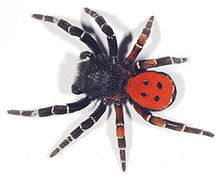| Velvet spiders Temporal range: Miocene–present PreꞒ Ꞓ O S D C P T J K Pg N | |
|---|---|

| |
| Eresus kollari, male | |
| Scientific classification | |
| Domain: | Eukaryota |
| Kingdom: | Animalia |
| Phylum: | Arthropoda |
| Subphylum: | Chelicerata |
| Class: | Arachnida |
| Order: | Araneae |
| Infraorder: | Araneomorphae |
| Family: | Eresidae C. L. Koch, 1845 |
| Diversity | |
| 9 genera, 128 species | |

| |

Velvet spiders (family Eresidae) are a small group (about 100 species in 9 genera) of spiders almost entirely limited to the Old World, with the exception of one species known from Brazil. In Europe, some are commonly called the ladybird spiders.
Description
This family can sometimes be confused with the jumping spiders, or those in the Palpimanidae family. These spiders are usually black or brown in colour, though they can also have brighter colours as pictured. As their common name implies they can look quite smooth and velvety. They usually live in silken tubes under objects, or underground, but the genus Stegodyphus, builds silken nests.
Identification
They can be distinguished from most species except the Penestomidae by their semi-rectangular carapace and clypeal hood. They can be distinguished from Penestomidae by the eye arrangement, straight anterior eye row and strongly recurved posterior eye row, with the median eyes close together.

Social behavior
Some species are nearly eusocial, lacking only a specialized caste system and a queen. They cooperate in brood rearing, unlike most other spiders except for some spitting spiders, African agelenid spiders in the genus Agelena, Monocentropus balfouri and a few others. Female velvet spiders exhibit a remarkable type of maternal care unique among arachnids. Upon the birth of her brood, the mother spider liquefies her internal organs and regurgitates this material as food. Once her capability to liquefy her insides is exhausted, the young sense this and consume the mother.
Spiders of the genus Stegodyphus genus, such as Stegodyphus sarasinorum in India, are known for their elaborate and robust nests and their colony integrity.
Genera
Main article: List of Eresidae speciesThe genus Penestomus was previously placed in Eresidae as the subfamily Penestominae, but was elevated to its own family, Penestomidae, in 2010. As of April 2019, the World Spider Catalog accepts the following genera:
- Adonea Simon, 1873 — Portugal, Algeria, Palestine
- Dorceus C. L. Koch, 1846 — Africa, Asia
- Dresserus Simon, 1876 — Africa
- Eresus Walckenaer, 1805 — Africa, Asia, Europe
- Gandanameno Lehtinen, 1967 — Namibia, South Africa, Malawi
- Loureedia Miller, Griswold, Scharff, Řezáč, Szűts & Marhabaie, 2012 — Africa, Asia
- Paradonea Lawrence, 1968 — Namibia, Botswana, South Africa
- Seothyra Purcell, 1903 — Africa
- Stegodyphus Simon, 1873 — Africa, Asia, Brazil
See also
References
- ^ "Family: Eresidae C. L. Koch, 1845". World Spider Catalog. Natural History Museum Bern. Retrieved 2019-04-22.
- Marais, Johan (2 November 2020). "Velvet Spider - ASI". African Snakebite Institute. Retrieved 2022-09-25.
- Miller, Jeremy; Griswold, Charles; Scharff, Nikolaj; Rezac, Milan; Szuts, Tamas; Marhabaie, Mohammad (2012-05-18). "The velvet spiders: an atlas of the Eresidae (Arachnida, Araneae)". ZooKeys (195): 1–144. doi:10.3897/zookeys.195.2342. ISSN 1313-2970. PMC 3361087. PMID 22679386.
- Seibt, U.; Wickler, W. (1988). "Interspecific Tolerance in Social Stegodyphus Spiders (Eresidae, Araneae)". Journal of Arachnology. 16: 35–39.
- Rachel Nuwer, Scientific American, October 2015.
- Lehtinen, P.T. (1967): Classification of the cribellate spiders and some allied families, with notes on the evolution of the suborder Araneomorpha. Ann. Zool. Fenn. 4: 199–468.
- Dippenaar-Schoeman, A.S. (1989): The African species of the subfamily Penestominae (Araneae: Eresidae): with description of two new species. Phytophylactica 21: 131–134.
External links
| Taxon identifiers | |
|---|---|
| Eresidae |
|